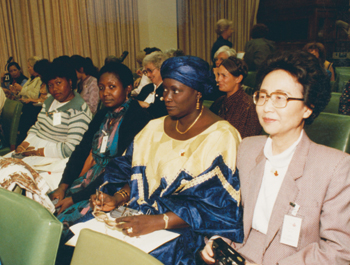Library of Parliament Research Publications
Occasional and Commissioned Papers
Selected Key Themes Addressed in IPU Assemblies
Women Parliamentarians and Gender Partnership
Through the years, the Meeting of Women Parliamentarians became a much fuller dialogue with a deeper level of discussion. The attendance became bigger and the debate got more open and interesting. The Coordinating Committee provided an important opportunity to reflect on the issues that were discussed at the main plenary from a woman’s perspective and from our perspective as women parliamentarians from around the world. — Paddy Torsney, former MP, 2012
Canadian women parliamentarians have been actively involved in IPU activities since the mid-1970s, and many have held senior IPU positions. Canadian parliamentarians – both men and women – have always encouraged the active participation of women delegates in IPU assemblies and the Union’s main bodies.
The Meeting of Women Parliamentarians and its Coordinating Committee
Between 1978 and 1984, women parliamentarians attending IPU assemblies met informally. In 1985 (Lomé), they decided to meet more formally, and later that year in Ottawa, Suzanne Fortin-Duplessis, MP, organized and chaired the Meeting of Women Parliamentarians. There it was decided that the women delegates would meet formally prior to the opening session to discuss matters of mutual interest as well as ways of increasing the participation of women within the Union and its various activities.
In 1988 (Sofia), on behalf of the Meeting of Women Parliamentarians, the Canadian Group recommended that the IPU amend its statutes to ensure that at least two elected members of its Executive Committee were women. The amendment was adopted.
In 1990 (Nicosia), Sheila Finestone, MP, was a force behind the creation of the Coordinating Committee of the Meeting of Women Parliamentarians; its goal is to provide continuity and to facilitate the planning and organization of the women’s meetings. In 1998 (Moscow), the IPU gave official status to the Meeting of Women Parliamentarians and its Coordinating Committee, and new provisions were adopted whereby the person elected President of the Coordinating Committee of Women Parliamentarians becomes an ex officio member of the Executive Committee.
Over the years, Canadian women parliamentarians have held various positions on the Coordinating Committee. For example, Sheila Finestone served as President (1991) and was both Vice-President and a geopolitical representative of the Twelve Plus Group (1996–1999). Similarly, Senator Joan Fraser was President and a geopolitical representative of the Twelve Plus Group (2004–2006). For their part, Paddy Torsney, MP (1994–1995) and Edna Anderson, MP (1992–1993) served as geopolitical representatives of the Twelve Plus Group. By virtue of being members of the IPU Executive Committee, both senators Finestone (1999–2001) and Fraser (2002–2003) served as ex officio members of the Coordinating Committee. Many other Canadian women parliamentarians also served in other capacities during IPU assemblies.
It took 98 years before one woman was elected on the Executive Committee. The group of women parliamentarians are simply asking for minimal representation to ensure that women are guaranteed a voice on the Executive Committee. Through time, mechanisms have been found to ensure adequate representation for different groups, be they ethnic, religious or representatives of economic interests. This is affirmative action and it is done to counter discrimination. ... I call on all delegates to support this amendment so that women parliamentarians have their rightful and complete place. — Senator Nathan Nurgitz, 1988

Meeting of Women Parliamentarians, 1985 (Ottawa)
Courtesy of Barbara Reynolds
Canadian women parliamentarians first participated in an IPU delegation in 1965 (Ottawa); on this occasion, three Canadian delegates – one senator and two MPs – were women. In total, 51 Canadian women have been IPU delegates. Of the 73 assemblies held between 1965 and 2012, 60 Canadian delegations have included women.
Gender Partnership Group
In 1997 (New Delhi), the Gender Partnership Group was established as a sub-committee of the IPU Executive Committee. Made up of four members (two men and two women), it monitors the composition of delegations to IPU assemblies, reviews the participation of women in all IPU activities and examines the gender composition of member parliaments. Senator Donald H. Oliver is currently a member of the Group and two other Canadians have served in this capacity: senators Finestone (2001–2002) and Fraser (2002–2003 and 2004–2006).
The work of the Gender Partnership Group has led to a series of amendments to the Union’s statutes which provide strong incentives to members to ensure that their delegations include both women and men. In 2012 (Kampala), Senator Oliver reported some of the Group’s findings. He indicated that women represented 28.2% of the total number of delegates to that assembly. Fifteen delegations had no women members; four of them were sanctioned for having no women delegates for the third time in a row. Senator Oliver also pointed out that, over the past 12 years, scarcely any women have been standing committee chairs. “Colleagues,” he declared, “it is clear that we can do better.”
Much of the Union’s work concerned human rights and, in many cases, it aimed to advance the rights of women. We have made great progress. This has shown that women, especially those without a strong voice in their own country, are not alone. Women have won key positions; this is one of the Union’s notable achievements. — Senator Gerald J. Comeau, 2012
In 2012 (city of Québec), the Gender Partnership Group will be holding a special plenary session to develop and release a plan of action to foster gender-sensitive parliaments. The session aims to provide a platform for parliamentarians to discuss what constitutes gender-sensitive parliaments and to identify objectives and concrete strategies for achieving such institutions.
During its annual meeting in December 1987, the Canadian IPU Group proceeded to the election of its Executive Committee. Following the election of the Chair and Treasurer, the Group then turned to the two positions of Vice-Chair. Marcel Prud’homme, MP, declined his nomination, stating it was important for Canada to show an example in electing women to its Executive Committee. Sheila Finestone, being the only candidate, was declared elected.
© Library of Parliament 2012

